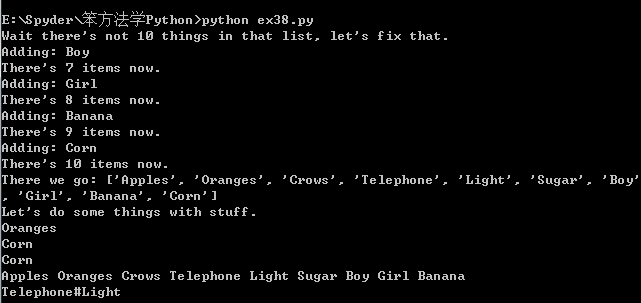习题 38:列表的操作
ten_things = "Apples Oranges Crows Telephone Light Sugar"
print("Wait there's not 10 things in that list, let's fix that.")
stuff = ten_things.split(' ')
more_stuff = ["Day", "Night", "Song", "Frisbee", "Corn", "Banana", "Girl", "Boy"]
while len(stuff) != 10:
next_one = more_stuff.pop() # pop() 默认 index = -1,删除最后一个列表值
print("Adding:", next_one)
stuff.append(next_one)
print("There's %d items now." % len(stuff))
print("There we go:", stuff)
print("Let's do some things with stuff.")
print(stuff[1])
print(stuff[-1])
print(stuff.pop()) # pop() 返回从列表中删除的元素
print(' '.join(stuff))
print('#'.join(stuff[3:5]))
join() 用于将序列中的元素以指定的字符连接,生成一个新的字符串。
习题 39:字典,可爱的字典
# creat a mapping of state to abbreviation
states = {
'Oregon': 'OR',
'Florida': 'FL',
'California': 'CA',
'New York': 'NY',
'Michigan': 'MI'
}
# creat a basic set of states and some cities in them
cities = {
'CA': 'San Francisco',
'MI': 'Detroit',
'FL': 'Jacksonville'
}
# add some more cities
cities['NY'] = 'New York'
cities['OR'] = 'Portland'
# print out some cities
print('-' * 10)
print("NY State has:", cities['NY'])
print("OR State has:", cities['OR'])
# print some states
print('-' * 10)
print("Michigan's abbreviation is:", states['Michigan'])
print("Florida's abbreviation is:", states['Florida'])
# do it by using the states then cities dict
print('-' * 10)
print("Michigan has:", cities[states['Michigan']])
print("Florida has:", cities[states['Florida']])
# print every state abbreviation
print('-' * 10)
for state, abbrev in states.items():
print("%s is abbreviated %s" % (state, abbrev))
# print every city in state
print('-' * 10)
for abbrev, city in cities.items():
print("%s has the city %s" % (abbrev, city))
# now do both at the same time
print('-' * 10)
for state, abbrev in states.items():
print("%s state is abbrevitated %s and has city %s" % (state, abbrev, cities[abbrev]))
print('-' * 10)
# safely get a abbreviation by state that might not be there
state = states.get('Texas', None)
if not state:
print("Sorry, no Texas.")
# get a city with a default value
city = cities.get('TX', 'Does Not Exist')
print("The city for the state 'TX' is: %s" % city)

items() 以列表返回可遍历的(键、值)元组数组。
get() 返回指定键的值,如果值不在字典中返回默认值 None。
